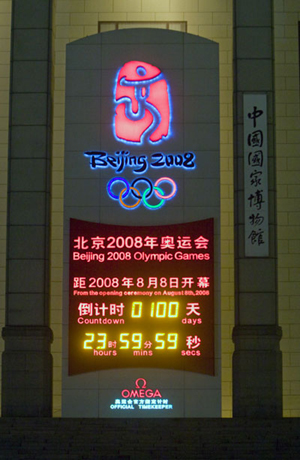
A picture taken yesterday shows the Countdown Board for
the Beijing 2008 Olympic Games in front of the National Museum in Beijing.
--chinadaily.com.cn/sohu.com
With 100 days to go from today before the curtain rises on the 2008 Olympic
Games, the organizers are busy fine-tuning for perfect staging of the world's
sporting spectacle.
Construction of venues, easing the city's traffic congestion and efforts to
clean up the air are all on target for the Aug. 8-24 event, and International
Olympic Committee officials have repeatedly voiced confidence that the athletes
were going to experience a top class Games here this summer.
"There is every reason to believe that we will see here a gold-medal
performance in August, also superb organization of the Olympic Games," Hein
Verbruggen, chairman of the IOC's coordination commission for the Beijing Games,
told reporters this month after his last inspection visit to the Chinese
capital.
IOC president Jacques Rogge also predicted the Beijing Games to be a "great
success".
"Here and there are small details to be fine-tuned but I am saying that the
level of preparedness ... is really excellent and ... I am optimistic that the
Games will be a great success," said Rogge.
The smooth construction of Olympic venues is a major source of confidence.
The National Stadium, known as the Bird's Nest for its giant latticework
structure of metal girders, opened and hosted its first official event on April
18 - a race-walking meet, putting an end to the city's massive construction
campaign that kicked off in December 2003.
Organizers said that the final touches on the 91,000-seat National Stadium
won't be complete until next month due to the extra work needed to prepare it
for the Aug. 8 opening ceremony. The iconic Olympic venue will also stage the
closing ceremony and the athletics competitions.
The nearby National Aquatics Center, known as the Water Cube, was completed
in January and hosted its first test event in February - the China Open swimming
competition. The box-like venue with three pools below ground level is made up
of a steel skeleton sheathed in a Teflon-like plastic membrance that mimics
bubbling water.
Fears about risks of competing outdoors in Beijing are dwindling amid the
continual improvement of the air quality. According to the Beijing Environmental
Protection Bureau, the city notched up 67 "blue sky days" from January to the
end of March, 12more than the same period a year earlier and the highest in nine
years.
Since being awarded the 2008 Games seven years ago, Beijing has engaged in an
aggressive effort to clean up its toxic haze. The city has spent nearly more
than 15 billion U.S. dollars on anti-pollution measures such as moving
factories, adding subway lines, upgrading boilers and converting coal-heated
homes to electric.
The authorities plan to close factories and force 19 heavy polluters to
reduce emissions by 30 percent for the two months around the Olympics and
Paralympics, and measures to limit factory emission are also in place for areas
surrounding the capital, including the city of Tianjin, the provinces of Hebei,
Shanxi and Shandong, and the Inner Mongolia region.
Based on a study released last month by IOC's medical commission, Rogge said
that the health of the athletes is "absolutely not in any danger" during Games
time.
Officials are also confident about bringing traffic congestion under control
with a ban on some cars during the Olympics and a plan to set up special lanes
on key roads that link competition sites with the athletes' village, the media
village and training venues.
"Private vehicles, excluding taxis, will be ordered to stay off roads every
other day in accordance with the even and odd numbers on the license plates,"
Beijing's vice mayor Ji Lin said last month.
"The government is working on a compensation scheme for car owners and we
will announce it later," he added.
Highlighting the public's enthusiasm for the greatest show on Earth, more
than one million people were in the hunt for an Olympics volunteer's post and
training programs are well under way.
Third phase of the domestic ticket sales will start on May 5, with large
crowds expected to chase the remaining 1.38 million tickets for 16 sports
including volleyball, athletics, boxing and football.
Zhu Yan, director of the Olympic ticketing center, promised that there will
be no repeat of the meltdown of the booking system that marred the previous
round of sales.
"We have confidence in the system because our ticketing sponsor has increased
the system's capacity by folds," he said. "Nonetheless, I hope that the public
won't be hasty to buy tickets."
Demand is excessive outside the Chinese mainland, too. "The main pressure at
the moment is that many National Olympic Committees continue to ask for more
tickets," said Zhu. "We are trying to dig out resources for tickets to satisfy
the demand worldwide."
Of the 6.8 million Olympic tickets available for sale, about 75percent are
reserved for the domestic public, with the rest going overseas.
The organizers are closer to selecting an official theme song with 30
candidate songs expected to be released at a gala show later on Wednesday.
"The final choice (of the theme song) is up to the BOCOG executive board,"
said Zhao Dongming, head of the BOCOG's cultural activities department.
Last, but not least, various campaigns aimed at improving the behavior of
local citizens finally bore fruits. More and more people are getting to abandon
old habits like spitting in public, jumping ahead in line and littering.
A survey released by Renmin University of China in February found that in
2007, 2.54 percent of people still spat, roughly a half of the figure for 2006,
and the occurrence of littering in public dropped from 5.3 percent in 2006 to
2.86 percent in 2007 and queue-jumping from 6 percent to 1.5 percent.



